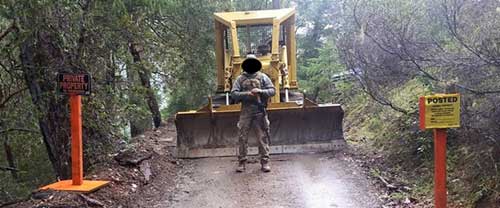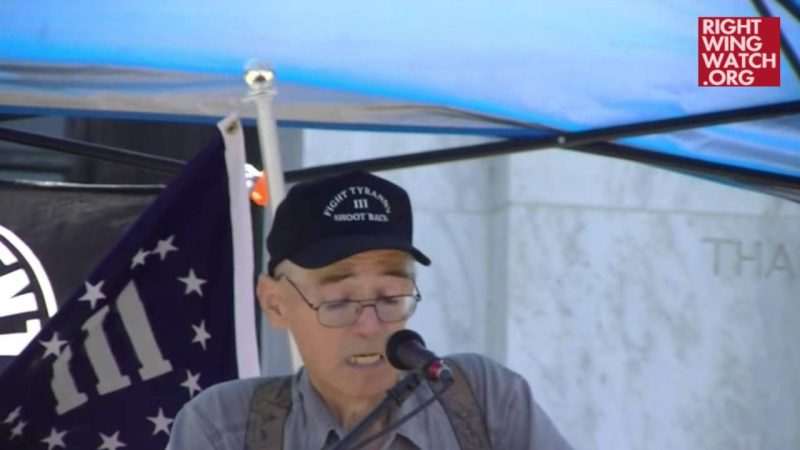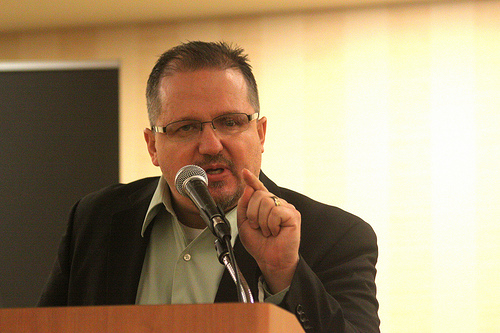At first glance, it seems like a fluke that the two most recent militia movement showdowns — a showdown at a gold mine and the current occupation of a federal building by groups protesting the arson sentences of a pair of ranchers — have taken place in Oregon. But Oregon, along with its history of laws excluding people of color and of rampant white supremacist terrorism, holds a key place in the development of the ideology that undergirds these antigovernment stand-offs.
As Daniel Levitas explains in “The Terrorist Next Door,” his 2002 book on the history of the militia movement, the ideology of today’s antigovernment extremists is built on the ideas first formulated by William Potter Gale, a racist and anti-Semitic California preacher who argued in the 1960s and 1970s that local “posses,” under the leadership of a county sheriff, hold the true law enforcement power in the country and must resist an oppressive federal government. But Gale’s ideas really took off when they were plagiarized and distributed by Mike Beach, a former member of the fascist “Silver Shirts” movement living in Oregon.
Levitas writes of how Gale’s ideas took hold in Oregon and were popularized by Beach:
Gale began his 1971 article by listing a “train of abuses” menacing America: submission to the United Nations Charter, unlawful taxation for the support of foreign governments, enactment of a “communist-inspired” income tax, and the passage of civil-rights legislation. “[The] Sovereign States have failed to repudiate the unlawful acts of … he federal government,” he declared. The county should be recognized as the seat of power for the people, and the sheriff is to be the “ONLY LEGAL LAW ENFORCEMENT OFFICER IN THE UNITED STATES OF AMERICA!” all healthy men between the ages of eighteen and forty-five who are not in the military could be mobilized into a posse comitatus to redress their grievances, Gale explained.
Although Gale initially relied on a network of Christian Identity believers and military veterans to spread the Posse message, he soon began promoting the idea among right-wing tax protesters as well. His suggestion to form local Posse units also was greeted warmly by members of the National Association for the Right to Keep and Bear Arms, and other groups devoted to “Second Amendment Absolutism,” which interpreted the Constitution as conferring an unfettered right to gun ownership. And because many of these militant defenders fo the Second Amendment also shared Gale’s belief that America already was in the grasp of a communist dictatorship, they were eager to band together in preparation for all-out war. …
From 1973 to 1976, Posse chapters spread to half a dozen counties in Oregon, where activists convened citizen grand juries, filed lawsuits against state officials, sent threatening letters to legislators, impersonated law enforcement officers, and campaigned vigorously against gun control, regional planning, and the IRS. It was also in Oregon that Henry Lamont “Mike” Beach, a retired laundry-equipment mechanic and salesman, plagiarized Gale’s writings and pronounced himself national leader of the “Sheriff’s Posse Comitatus.” Although he lacked Bill Gale’s charisma, Beach played a crucial role in spreading the Posse message across the nation. Thirty years earlier, Beach had been active in the right-wing Silver Shirt Legion of America and bringing Gale’s idea of the Posse Comitatus to fruitino was the realization of a lifelong ambition. From the offices of his Citizens Law Enforcement Research Committee in Portland, Beach disseminated thousands of copies of his pirated version of Gale’s Posse manifesto, which he dubbed the Possee Blue Book. He also sold hundreds of “Posse charters” to eager activists for $21 apiece to be used by any group of seven white Christian men seeking to launch a local chapter.
Although members of today’s “Patriot” movement would never directly cite Gale or Beach, the ideology that the two developed and popularized continues to undergird the movement. In a press release on New Year’s Day, Cliven Bundy, the Nevada rancher whose sons are leading the standoff in Oregon — which is populated by many out-of-state activists — echoed some of the same refrains. He claimed that the U.S. government has no jurisdiction over the lands in question, insisted that the county sheriff take the two ranchers into “protective custody” to shield them from the federal government, and finally suggested that an independent group of “we the people” form a “grand jury” to take the case on themselves, another posse comitatus idea:
The United States Justice Department has NO jurisdiction or authority within the State of Oregon, County of Harney over this type of ranch management. These lands are not under U.S. treaties or commerce, they are not article 4 territories, and Congress does not have unlimited power. These lands have been admitted into statehood and are part of the great State of Oregon and the citizens of Harney County enjoy the fullness of the protections of the U.S. Constitution. The U.S. Constitution limits United States government.
It is my suggestion, Steven Hammond, that you go and check yourself into Harney County jail asking for protective custody. It is my suggestion, Dwight Hammond, that you go and check yourself into Harney County jail asking for protective custody. It is my suggestion, Harney County Sheriff David Ward, accept these two ranchers into your jail, notify the United States Solicitor in Washington DC that you have these two ranchers in Harney County jail, that they will remain there indefinitely under your protective custody and the protection of We the People of Harney County and We the People of the United States of America.
I suggest an Evidentiary Hearing or a Grand Jury be formed by We the People.







